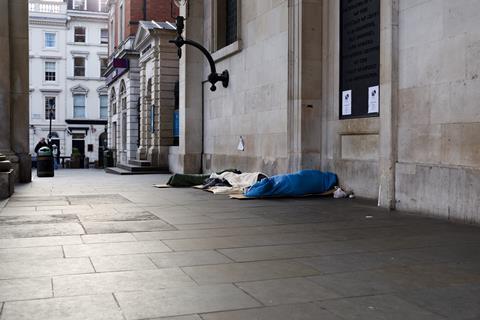Sadiq Khan to set aside additional £10m to tackle problem
Sadiq Khan has announced a pledge to end rough sleeping in London by 2030 if he is re-elected at the next election on 2 May.

In a speech this morning, Khan said his plan to eliminate rough sleeping in the capital will involve setting aside an extra £10m in investment, which he added is City Hall’s “biggest single intervention” to tackle rough sleeping on record.
The money will be used to set up an expanded network of Ending Homelessness Hubs across the city.
The hubs will provide specialist assessment and support and help an additional 1,700 rough sleepers off the streets annually by the end of the mayoral term, he said.
The new network of Ending Homelessness Hubs will build on the current No Second Night Out (NSNO) services, which were established in 2011 by the London Mayor’s Task Force and homeless charity St Mungo’s.
The NSNO service identifies new rough sleepers and helps them off the streets immediately, to try and prevent them from becoming entrenched in long-term homelessness.
>> See also: Conservative MPs set to revolt against government plans to criminalise rough sleeping
>> See also: NHF raises ‘serious concern’ as three county councils propose to decommission homelessness services
The network of hubs will double from the current core provision of three, to six by the end of the term, helping an additional 1,700 people sleeping rough a year with rapid assessment and rehousing.
In his speech, Khan pledged “to end the indignity, fear and isolation felt by those forced to endure a life on the street once and for all”.
Khan will also strengthen joint-working with all London’s boroughs and charities helping rough sleepers and work side-by-side with the next government “to overcome the social and economic injustices which leave our society scarred and our people with no place to call home”.
He added it was time “to reject the notion that homelessness is some natural, stubborn feature of modern life that we have no option but to abide”.
According to the latest government figures, it was estimated that 3,898 individuals were sleeping rough on a single night in last autumn.
While this figure is still less than the highest recorded in autumn 2017, which saw an estimated 4,751 individuals sleeping rough in one night, it represents a 27% increase from 2022.
Furthermore, it is a 120% increase in rough sleeping compared to 2010, when 1,110 individuals were rough sleeping on a single night.
In their 2019 manifesto, the Conservatives pledged to end rough sleeping by the end of this parliament. In 2018, the government announced a £100m plan to end rough sleeping, and in 2019, allocated a further £260m to local homelessness services.
In November last year, the then Home Secretary Suella Braverman launched a plan to crackdown on “nuisance” rough sleepers. The Criminal Justice Bill, which is currently progressing through parliament, would give police the authority to fine or move on individuals who are begging or rough sleeping if they are deemed to be causing a “nuisance to the public”.
Earlier this month, a group of 40 Conservative MPs, led by Bob Blackman MP, announced their intention to revolt against the plans to criminalise rough sleeping. They are also working on an amendment which would remove these measures from the bill and repeal the 200-year-old Vagrancy Act.











No comments yet